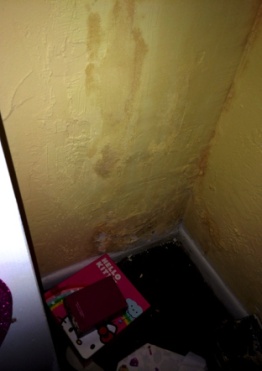Find a pre-screened local mold removal specialist Free Estimate
Find a Mold Specialist Now
Click or Call, Toll-Free 24/7
Chronic Inflammatory Response Syndrome
Chronic inflammatory response syndrome (CIRS) is a serious, multi-symptom illness that negatively impacts more than one system in the body. Most often is it caused by exposure to harmful mycotoxins or neurotoxins in our environment. These toxins may be a result of:
- Mold in the home.
- Pfiesteria – Microscopic organism that produces toxins known to cause large fish kills.
- Cyanobacteria – Commonly found in lakes and rivers.
- Lyme disease – Transmitted by tick bites.
- Poisonous spider bites.
- Ciguatera – A toxin affecting reef fish that are often consumed by humans.
The effects of this inflammatory syndrome vary depending on the person and their experience. However, the respiratory, neurological, psychological, and gastrointestinal symptoms can be life-changing, no matter the source, which is why it is essential to know the signs and see your doctor if you think you have this syndrome. An important fact to remember is that mold allergies are not the same as mold illness, so it is critical to determine the cause of your symptoms. If you recently experienced any flooding or water-loss situation in your home, or if the interior of your home has been affected by higher than normal humidity levels, you will also want to determine if your symptoms of CIRS are being caused by an extended exposure to some type of mold issue in your home.
What Are the Symptoms of Chronic Inflammatory Response Syndrome (CIRS)?
Since this syndrome can develop in our bodies from multiple biological sources, different acute indicators may arise in different people. Whether the syndrome is the result from eating contaminated food, breathing in mold, or some other factor, these are a few of the general and more common symptoms to be aware of.

The general symptoms of CIRS may include:
- Fatigue and/or general malaise
- Chills
- Headache
- Nausea and/or vomiting
- Joint and/or muscle pain
- Fever
- Stomach pain
- Shortness of breath
- Nasal and/or sinus problems
- Eye irritation
- Sensitive skin
Characteristics of CIRS From Mold Exposure
It is important to understand that the effects of Chronic Inflammatory Response Syndrome from mold exposure will present itself differently than if the symptoms were caused by something else, such as a spider bite, a burn, or Lyme disease. In fact, when a person develops this syndrome due to mold exposure, specifically, they will usually experience some of these symptoms, in addition to those mentioned above:
- Headache
- Sinus congestion
- Sore throat
- Nosebleeds
- Itchy eyes
- Cough
- Flu symptoms
- Wheezing
- Stomachache
These symptoms are also typical signs of illnesses like influenza, indoor and outdoor allergies, and the common cold, so it is important to see your physician if you experience any of them.
Seeing a Doctor for CIRS
If you have any of the above symptoms of CIRS, see a doctor right away. It is critical to seek medical advice as soon as possible, because unlike dealing with the flu or a cold, the effects of Chronic Inflammatory Response Syndrome may not go away. In fact, ignoring the acute effects of the disease can lead to the development of chronic health illnesses, which can significantly affect you or your family’s future quality of life.
Over time, the chronic effects of CIRS can lead to:

- Light sensitivity
- Memory problems
- Disorientation and/or confusion
- Mood dysregulation
- Body temperature dysregulation
- Night sweating
- Muscle weakness
- Depression
- Frequent urination
- Static shocks
- Increased thirst
- Tremor
- Hair loss
- Fatigue
- Appetite changes
- Metallic taste
The chronic symptoms of CIRS are alarming and could have a significant impact on your health. Therefore, it is not only important to treat your symptoms, but to also determine their cause as soon as possible. Make an appointment with your doctor to review how you are feeling. At your visit, your doctor will perform a medical exam, as well as discuss your health history for illnesses that cause CIRS and other forms of inflammation. They may also ask you if your immediate family members currently have or have ever had a condition like Lyme disease or cancer. In most cases, they will want a blood test to see if your body is reacting to inflammation. They will look for other reasons for your symptoms, including diabetes mellitus, liver disease, renal disease, and several autoimmune illnesses. They will also talk to you about your diet and home environment to determine if the cause is external.
Talk to your doctor about the chances that the toxicity is coming from your home or what you may be eating. Whether you need to eliminate recluse spiders from your attic, treat your Lyme disease, or remove mold from your bathroom ceiling, stopping the reason for your CIRS at the source can improve your medical prognosis and ensure that no one else in your family develops the illness. It can also help rule out other types of disease.
Checking Your Home for Signs of Mold
No matter the cause, chronic inflammatory response syndrome is a severe illness with lasting consequences. In many cases, it does develop as a result of toxic mold exposure, which is why it is important to have your home checked for a mold infestation if you or your doctor think mold may be causing your symptoms. A professional mold inspection completed by an experienced mold remediation professional will determine if mold is present, and they will let you know what needs to be done to safely and completely remove it.
You can schedule a complimentary in-home consultation with an experienced mold removal company in your area for absolutely no cost to you. They will investigate for signs of mold in your home and provide you, and your doctor at your request, with a formal report if mold is present. They will also determine what issue has caused the mold to grow. Follow this link to get a list of qualified mold removal professionals in your area that offer free in-home mold inspections.
Return From Chronic Inflammatory Response Syndrome To Our Main Symptoms Page
Ref:
CDC – Causes of Chronic Inflammatory Diseases
WebMD – Lyme Disease
Free Home Inspection By A Mold Removal Specialist
Search This Website
Recent Articles
-
See Our 5 Recommended Mold Removal Companies in Covington, KY
Apr 16, 25 12:59 PM
-
See Our 5 Recommended Mold Removal Companies in Wheaton, IL
Jun 20, 24 10:33 AM
-
See Our 5 Recommended Mold Removal Companies in Aberdeen, SD
Oct 08, 21 04:05 PM





